Organizational Challenges of Profit, Goals, and CSR in Business Ethics
VerifiedAdded on 2020/05/28
|10
|2198
|93
Report
AI Summary
This report delves into the significance of business ethics and corporate social responsibility (CSR) within a global context. It examines how ethical considerations influence organizational decision-making, profitability, and goal achievement. The study highlights the challenges organizations face in balancing profit maximization, achieving business objectives, and upholding CSR principles. It explores the impact of factors such as shrinking government roles, disclosure demands, customer and investor influences, and the competitive landscape. The report emphasizes the importance of stakeholder engagement and the triple bottom line model (environmental, social, and economic) in shaping ethical business practices. It also provides an overview of challenges and challenges in the modern business environment, underscoring the need for organizations to adapt to maintain long-term sustainability and success.
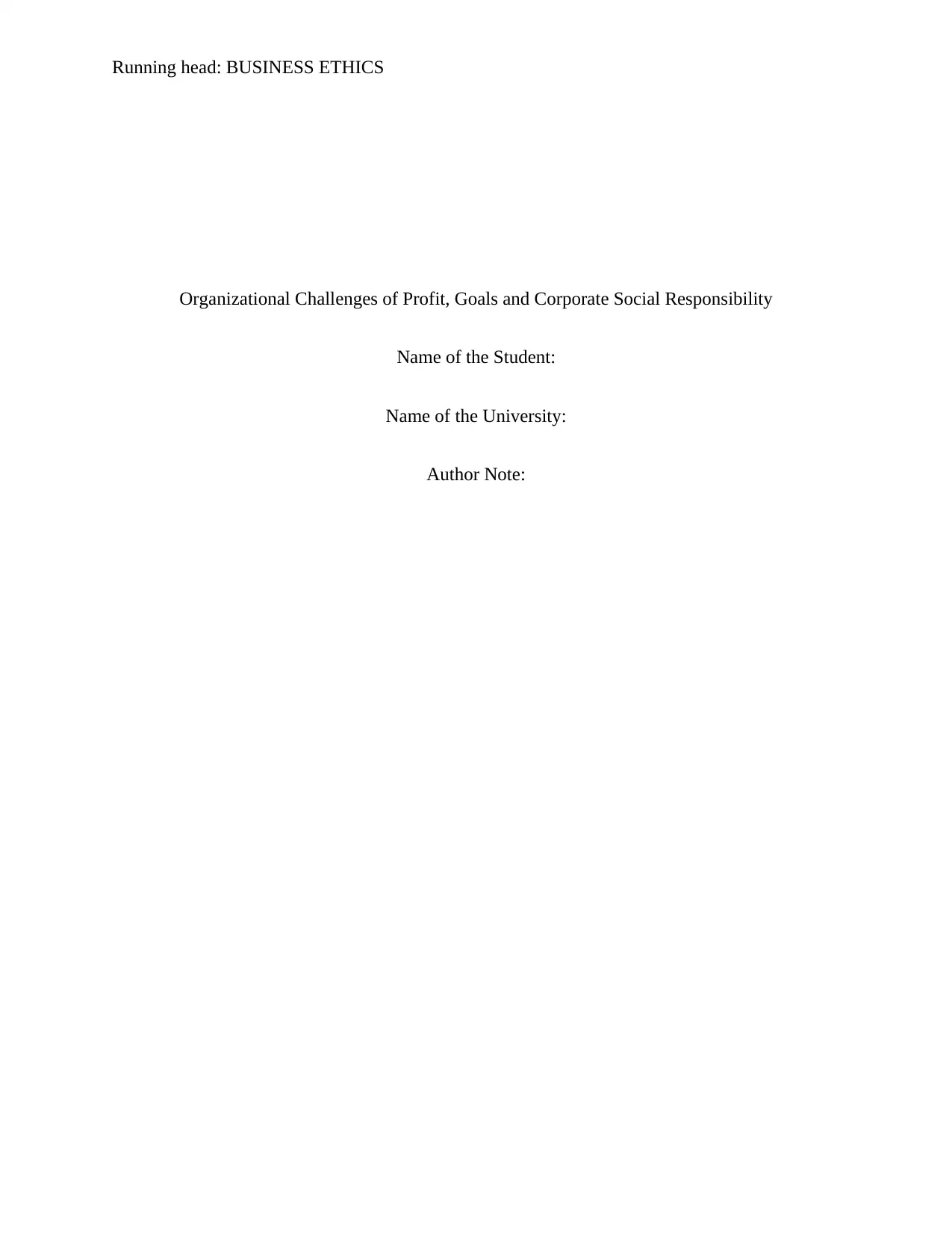
Running head: BUSINESS ETHICS
Organizational Challenges of Profit, Goals and Corporate Social Responsibility
Name of the Student:
Name of the University:
Author Note:
Organizational Challenges of Profit, Goals and Corporate Social Responsibility
Name of the Student:
Name of the University:
Author Note:
Paraphrase This Document
Need a fresh take? Get an instant paraphrase of this document with our AI Paraphraser
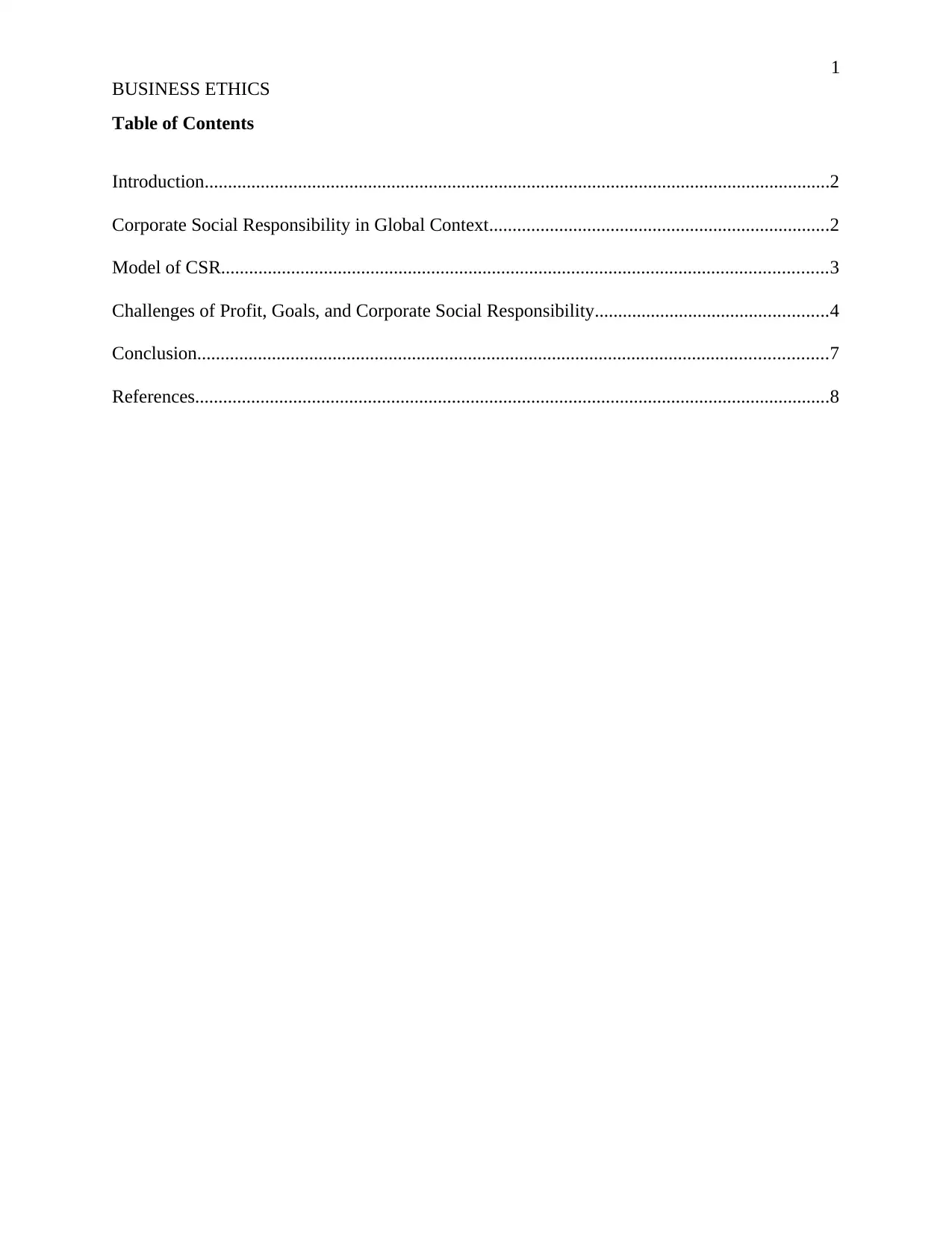
1
BUSINESS ETHICS
Table of Contents
Introduction......................................................................................................................................2
Corporate Social Responsibility in Global Context.........................................................................2
Model of CSR..................................................................................................................................3
Challenges of Profit, Goals, and Corporate Social Responsibility..................................................4
Conclusion.......................................................................................................................................7
References........................................................................................................................................8
BUSINESS ETHICS
Table of Contents
Introduction......................................................................................................................................2
Corporate Social Responsibility in Global Context.........................................................................2
Model of CSR..................................................................................................................................3
Challenges of Profit, Goals, and Corporate Social Responsibility..................................................4
Conclusion.......................................................................................................................................7
References........................................................................................................................................8
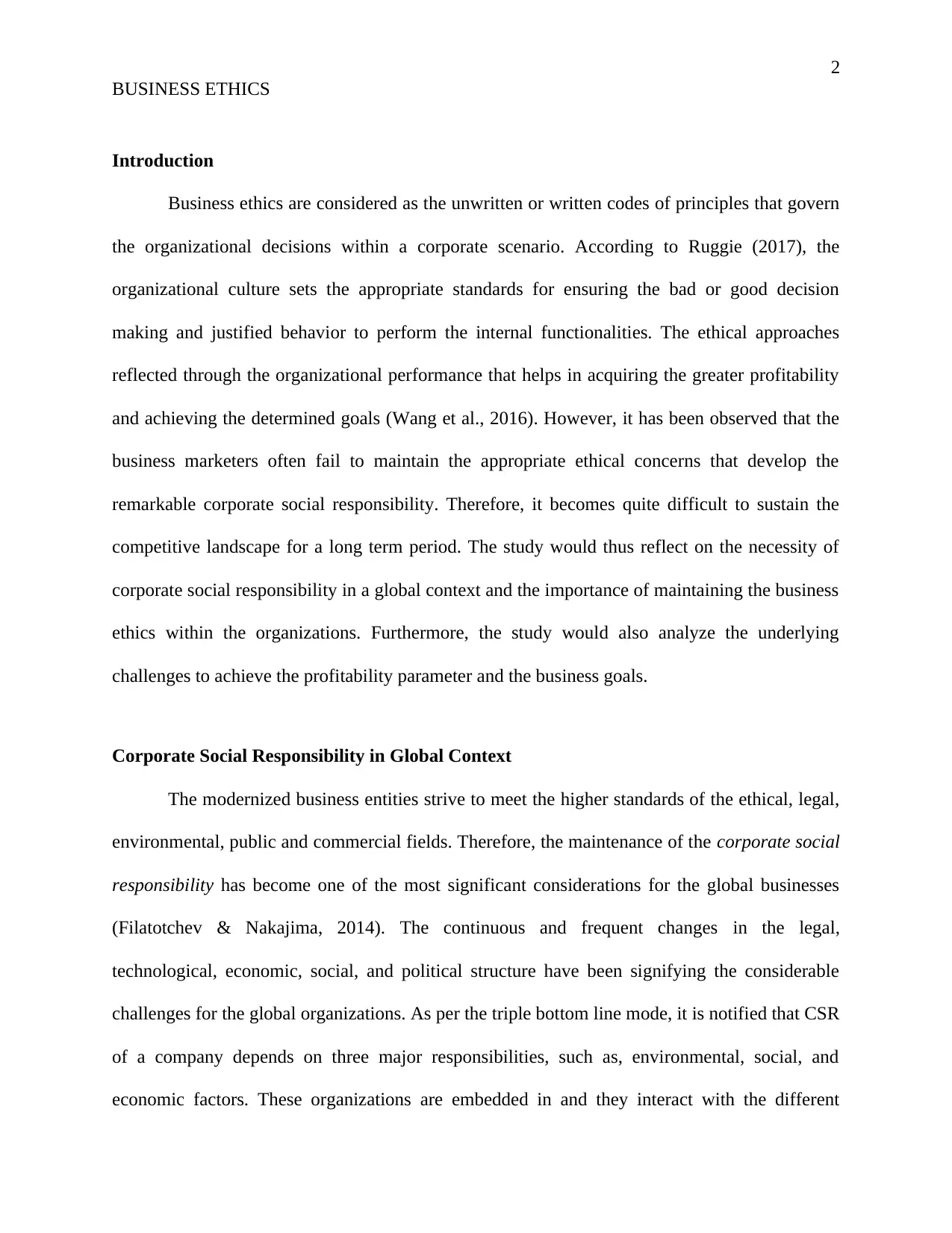
2
BUSINESS ETHICS
Introduction
Business ethics are considered as the unwritten or written codes of principles that govern
the organizational decisions within a corporate scenario. According to Ruggie (2017), the
organizational culture sets the appropriate standards for ensuring the bad or good decision
making and justified behavior to perform the internal functionalities. The ethical approaches
reflected through the organizational performance that helps in acquiring the greater profitability
and achieving the determined goals (Wang et al., 2016). However, it has been observed that the
business marketers often fail to maintain the appropriate ethical concerns that develop the
remarkable corporate social responsibility. Therefore, it becomes quite difficult to sustain the
competitive landscape for a long term period. The study would thus reflect on the necessity of
corporate social responsibility in a global context and the importance of maintaining the business
ethics within the organizations. Furthermore, the study would also analyze the underlying
challenges to achieve the profitability parameter and the business goals.
Corporate Social Responsibility in Global Context
The modernized business entities strive to meet the higher standards of the ethical, legal,
environmental, public and commercial fields. Therefore, the maintenance of the corporate social
responsibility has become one of the most significant considerations for the global businesses
(Filatotchev & Nakajima, 2014). The continuous and frequent changes in the legal,
technological, economic, social, and political structure have been signifying the considerable
challenges for the global organizations. As per the triple bottom line mode, it is notified that CSR
of a company depends on three major responsibilities, such as, environmental, social, and
economic factors. These organizations are embedded in and they interact with the different
BUSINESS ETHICS
Introduction
Business ethics are considered as the unwritten or written codes of principles that govern
the organizational decisions within a corporate scenario. According to Ruggie (2017), the
organizational culture sets the appropriate standards for ensuring the bad or good decision
making and justified behavior to perform the internal functionalities. The ethical approaches
reflected through the organizational performance that helps in acquiring the greater profitability
and achieving the determined goals (Wang et al., 2016). However, it has been observed that the
business marketers often fail to maintain the appropriate ethical concerns that develop the
remarkable corporate social responsibility. Therefore, it becomes quite difficult to sustain the
competitive landscape for a long term period. The study would thus reflect on the necessity of
corporate social responsibility in a global context and the importance of maintaining the business
ethics within the organizations. Furthermore, the study would also analyze the underlying
challenges to achieve the profitability parameter and the business goals.
Corporate Social Responsibility in Global Context
The modernized business entities strive to meet the higher standards of the ethical, legal,
environmental, public and commercial fields. Therefore, the maintenance of the corporate social
responsibility has become one of the most significant considerations for the global businesses
(Filatotchev & Nakajima, 2014). The continuous and frequent changes in the legal,
technological, economic, social, and political structure have been signifying the considerable
challenges for the global organizations. As per the triple bottom line mode, it is notified that CSR
of a company depends on three major responsibilities, such as, environmental, social, and
economic factors. These organizations are embedded in and they interact with the different
⊘ This is a preview!⊘
Do you want full access?
Subscribe today to unlock all pages.

Trusted by 1+ million students worldwide
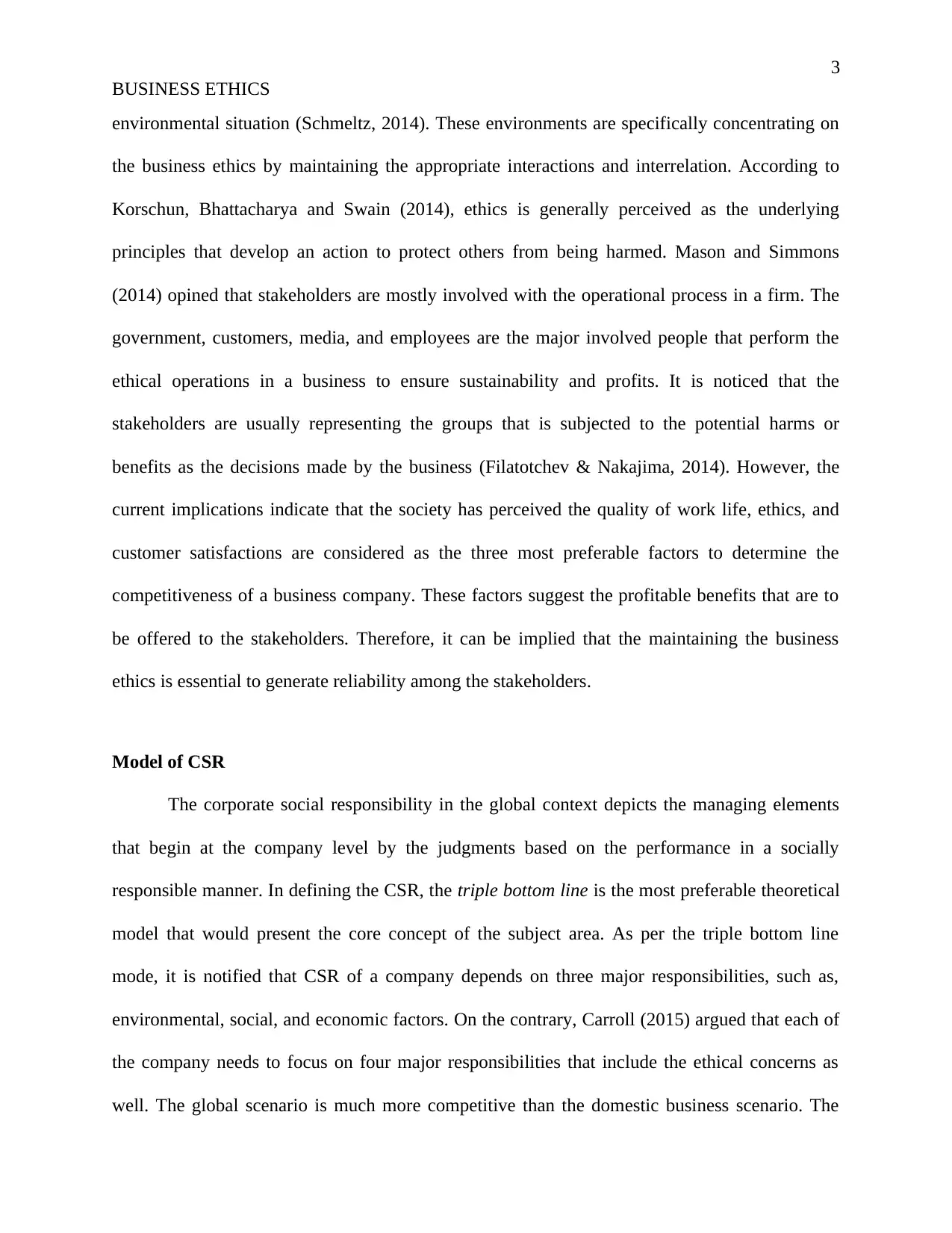
3
BUSINESS ETHICS
environmental situation (Schmeltz, 2014). These environments are specifically concentrating on
the business ethics by maintaining the appropriate interactions and interrelation. According to
Korschun, Bhattacharya and Swain (2014), ethics is generally perceived as the underlying
principles that develop an action to protect others from being harmed. Mason and Simmons
(2014) opined that stakeholders are mostly involved with the operational process in a firm. The
government, customers, media, and employees are the major involved people that perform the
ethical operations in a business to ensure sustainability and profits. It is noticed that the
stakeholders are usually representing the groups that is subjected to the potential harms or
benefits as the decisions made by the business (Filatotchev & Nakajima, 2014). However, the
current implications indicate that the society has perceived the quality of work life, ethics, and
customer satisfactions are considered as the three most preferable factors to determine the
competitiveness of a business company. These factors suggest the profitable benefits that are to
be offered to the stakeholders. Therefore, it can be implied that the maintaining the business
ethics is essential to generate reliability among the stakeholders.
Model of CSR
The corporate social responsibility in the global context depicts the managing elements
that begin at the company level by the judgments based on the performance in a socially
responsible manner. In defining the CSR, the triple bottom line is the most preferable theoretical
model that would present the core concept of the subject area. As per the triple bottom line
mode, it is notified that CSR of a company depends on three major responsibilities, such as,
environmental, social, and economic factors. On the contrary, Carroll (2015) argued that each of
the company needs to focus on four major responsibilities that include the ethical concerns as
well. The global scenario is much more competitive than the domestic business scenario. The
BUSINESS ETHICS
environmental situation (Schmeltz, 2014). These environments are specifically concentrating on
the business ethics by maintaining the appropriate interactions and interrelation. According to
Korschun, Bhattacharya and Swain (2014), ethics is generally perceived as the underlying
principles that develop an action to protect others from being harmed. Mason and Simmons
(2014) opined that stakeholders are mostly involved with the operational process in a firm. The
government, customers, media, and employees are the major involved people that perform the
ethical operations in a business to ensure sustainability and profits. It is noticed that the
stakeholders are usually representing the groups that is subjected to the potential harms or
benefits as the decisions made by the business (Filatotchev & Nakajima, 2014). However, the
current implications indicate that the society has perceived the quality of work life, ethics, and
customer satisfactions are considered as the three most preferable factors to determine the
competitiveness of a business company. These factors suggest the profitable benefits that are to
be offered to the stakeholders. Therefore, it can be implied that the maintaining the business
ethics is essential to generate reliability among the stakeholders.
Model of CSR
The corporate social responsibility in the global context depicts the managing elements
that begin at the company level by the judgments based on the performance in a socially
responsible manner. In defining the CSR, the triple bottom line is the most preferable theoretical
model that would present the core concept of the subject area. As per the triple bottom line
mode, it is notified that CSR of a company depends on three major responsibilities, such as,
environmental, social, and economic factors. On the contrary, Carroll (2015) argued that each of
the company needs to focus on four major responsibilities that include the ethical concerns as
well. The global scenario is much more competitive than the domestic business scenario. The
Paraphrase This Document
Need a fresh take? Get an instant paraphrase of this document with our AI Paraphraser
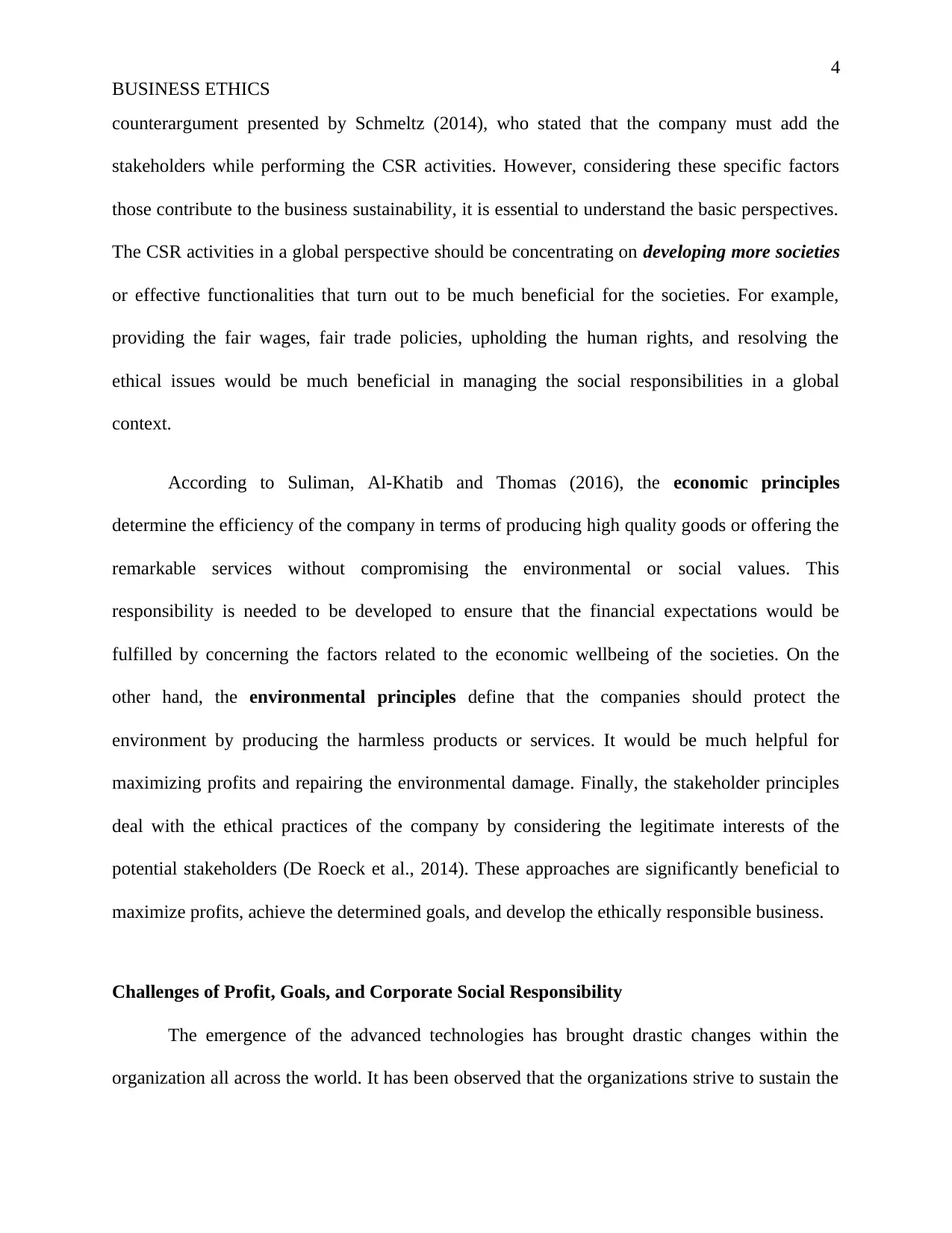
4
BUSINESS ETHICS
counterargument presented by Schmeltz (2014), who stated that the company must add the
stakeholders while performing the CSR activities. However, considering these specific factors
those contribute to the business sustainability, it is essential to understand the basic perspectives.
The CSR activities in a global perspective should be concentrating on developing more societies
or effective functionalities that turn out to be much beneficial for the societies. For example,
providing the fair wages, fair trade policies, upholding the human rights, and resolving the
ethical issues would be much beneficial in managing the social responsibilities in a global
context.
According to Suliman, Al-Khatib and Thomas (2016), the economic principles
determine the efficiency of the company in terms of producing high quality goods or offering the
remarkable services without compromising the environmental or social values. This
responsibility is needed to be developed to ensure that the financial expectations would be
fulfilled by concerning the factors related to the economic wellbeing of the societies. On the
other hand, the environmental principles define that the companies should protect the
environment by producing the harmless products or services. It would be much helpful for
maximizing profits and repairing the environmental damage. Finally, the stakeholder principles
deal with the ethical practices of the company by considering the legitimate interests of the
potential stakeholders (De Roeck et al., 2014). These approaches are significantly beneficial to
maximize profits, achieve the determined goals, and develop the ethically responsible business.
Challenges of Profit, Goals, and Corporate Social Responsibility
The emergence of the advanced technologies has brought drastic changes within the
organization all across the world. It has been observed that the organizations strive to sustain the
BUSINESS ETHICS
counterargument presented by Schmeltz (2014), who stated that the company must add the
stakeholders while performing the CSR activities. However, considering these specific factors
those contribute to the business sustainability, it is essential to understand the basic perspectives.
The CSR activities in a global perspective should be concentrating on developing more societies
or effective functionalities that turn out to be much beneficial for the societies. For example,
providing the fair wages, fair trade policies, upholding the human rights, and resolving the
ethical issues would be much beneficial in managing the social responsibilities in a global
context.
According to Suliman, Al-Khatib and Thomas (2016), the economic principles
determine the efficiency of the company in terms of producing high quality goods or offering the
remarkable services without compromising the environmental or social values. This
responsibility is needed to be developed to ensure that the financial expectations would be
fulfilled by concerning the factors related to the economic wellbeing of the societies. On the
other hand, the environmental principles define that the companies should protect the
environment by producing the harmless products or services. It would be much helpful for
maximizing profits and repairing the environmental damage. Finally, the stakeholder principles
deal with the ethical practices of the company by considering the legitimate interests of the
potential stakeholders (De Roeck et al., 2014). These approaches are significantly beneficial to
maximize profits, achieve the determined goals, and develop the ethically responsible business.
Challenges of Profit, Goals, and Corporate Social Responsibility
The emergence of the advanced technologies has brought drastic changes within the
organization all across the world. It has been observed that the organizations strive to sustain the
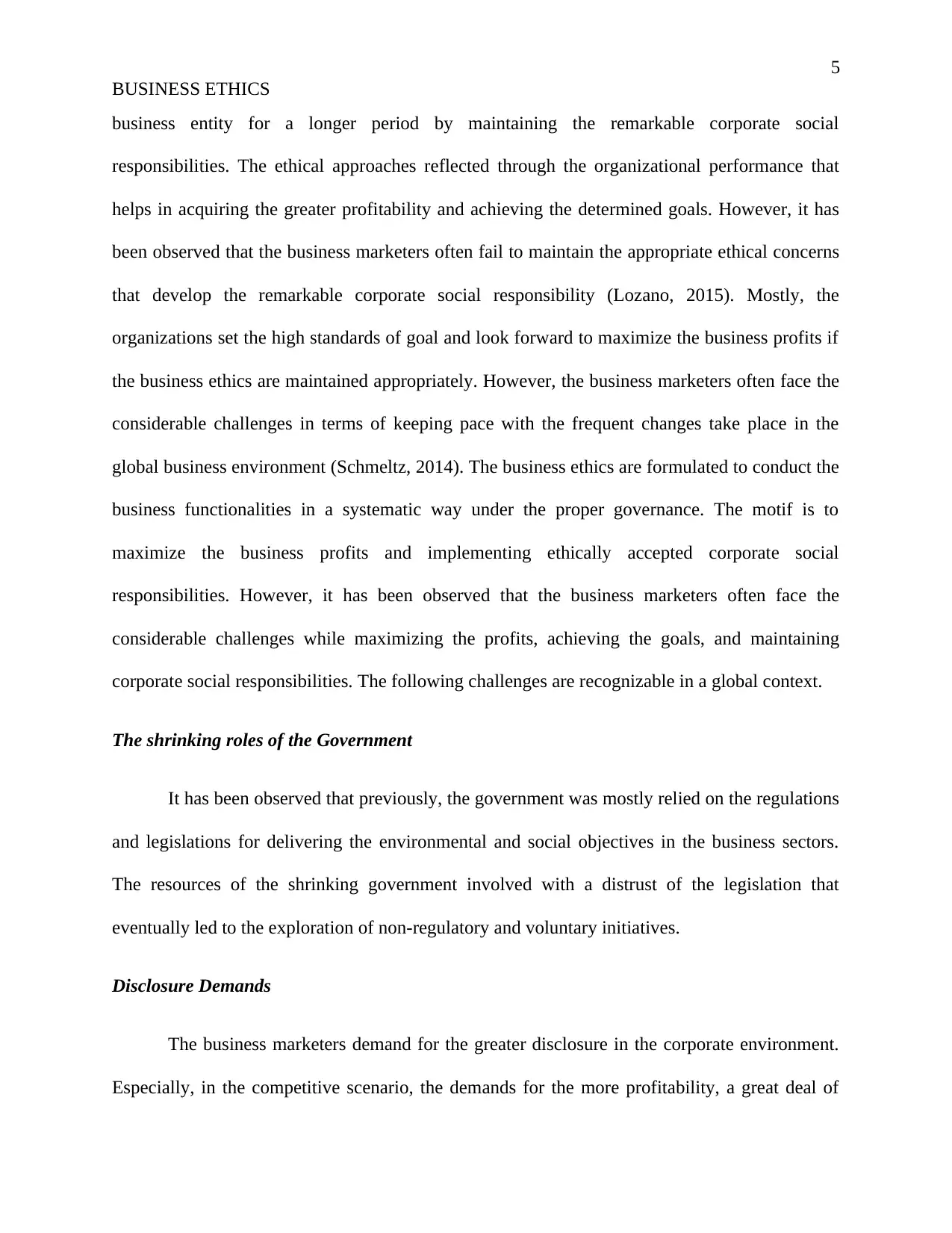
5
BUSINESS ETHICS
business entity for a longer period by maintaining the remarkable corporate social
responsibilities. The ethical approaches reflected through the organizational performance that
helps in acquiring the greater profitability and achieving the determined goals. However, it has
been observed that the business marketers often fail to maintain the appropriate ethical concerns
that develop the remarkable corporate social responsibility (Lozano, 2015). Mostly, the
organizations set the high standards of goal and look forward to maximize the business profits if
the business ethics are maintained appropriately. However, the business marketers often face the
considerable challenges in terms of keeping pace with the frequent changes take place in the
global business environment (Schmeltz, 2014). The business ethics are formulated to conduct the
business functionalities in a systematic way under the proper governance. The motif is to
maximize the business profits and implementing ethically accepted corporate social
responsibilities. However, it has been observed that the business marketers often face the
considerable challenges while maximizing the profits, achieving the goals, and maintaining
corporate social responsibilities. The following challenges are recognizable in a global context.
The shrinking roles of the Government
It has been observed that previously, the government was mostly relied on the regulations
and legislations for delivering the environmental and social objectives in the business sectors.
The resources of the shrinking government involved with a distrust of the legislation that
eventually led to the exploration of non-regulatory and voluntary initiatives.
Disclosure Demands
The business marketers demand for the greater disclosure in the corporate environment.
Especially, in the competitive scenario, the demands for the more profitability, a great deal of
BUSINESS ETHICS
business entity for a longer period by maintaining the remarkable corporate social
responsibilities. The ethical approaches reflected through the organizational performance that
helps in acquiring the greater profitability and achieving the determined goals. However, it has
been observed that the business marketers often fail to maintain the appropriate ethical concerns
that develop the remarkable corporate social responsibility (Lozano, 2015). Mostly, the
organizations set the high standards of goal and look forward to maximize the business profits if
the business ethics are maintained appropriately. However, the business marketers often face the
considerable challenges in terms of keeping pace with the frequent changes take place in the
global business environment (Schmeltz, 2014). The business ethics are formulated to conduct the
business functionalities in a systematic way under the proper governance. The motif is to
maximize the business profits and implementing ethically accepted corporate social
responsibilities. However, it has been observed that the business marketers often face the
considerable challenges while maximizing the profits, achieving the goals, and maintaining
corporate social responsibilities. The following challenges are recognizable in a global context.
The shrinking roles of the Government
It has been observed that previously, the government was mostly relied on the regulations
and legislations for delivering the environmental and social objectives in the business sectors.
The resources of the shrinking government involved with a distrust of the legislation that
eventually led to the exploration of non-regulatory and voluntary initiatives.
Disclosure Demands
The business marketers demand for the greater disclosure in the corporate environment.
Especially, in the competitive scenario, the demands for the more profitability, a great deal of
⊘ This is a preview!⊘
Do you want full access?
Subscribe today to unlock all pages.

Trusted by 1+ million students worldwide
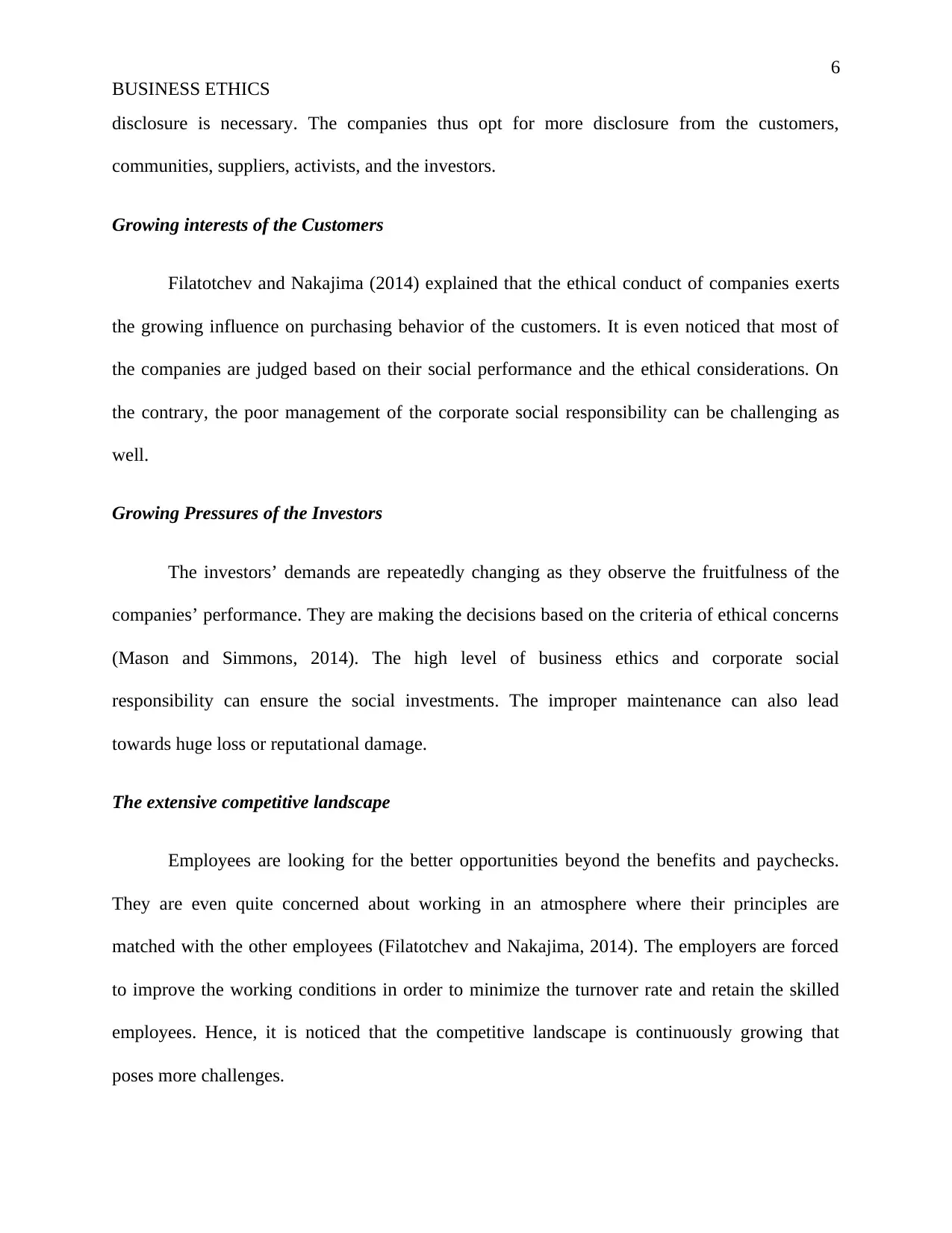
6
BUSINESS ETHICS
disclosure is necessary. The companies thus opt for more disclosure from the customers,
communities, suppliers, activists, and the investors.
Growing interests of the Customers
Filatotchev and Nakajima (2014) explained that the ethical conduct of companies exerts
the growing influence on purchasing behavior of the customers. It is even noticed that most of
the companies are judged based on their social performance and the ethical considerations. On
the contrary, the poor management of the corporate social responsibility can be challenging as
well.
Growing Pressures of the Investors
The investors’ demands are repeatedly changing as they observe the fruitfulness of the
companies’ performance. They are making the decisions based on the criteria of ethical concerns
(Mason and Simmons, 2014). The high level of business ethics and corporate social
responsibility can ensure the social investments. The improper maintenance can also lead
towards huge loss or reputational damage.
The extensive competitive landscape
Employees are looking for the better opportunities beyond the benefits and paychecks.
They are even quite concerned about working in an atmosphere where their principles are
matched with the other employees (Filatotchev and Nakajima, 2014). The employers are forced
to improve the working conditions in order to minimize the turnover rate and retain the skilled
employees. Hence, it is noticed that the competitive landscape is continuously growing that
poses more challenges.
BUSINESS ETHICS
disclosure is necessary. The companies thus opt for more disclosure from the customers,
communities, suppliers, activists, and the investors.
Growing interests of the Customers
Filatotchev and Nakajima (2014) explained that the ethical conduct of companies exerts
the growing influence on purchasing behavior of the customers. It is even noticed that most of
the companies are judged based on their social performance and the ethical considerations. On
the contrary, the poor management of the corporate social responsibility can be challenging as
well.
Growing Pressures of the Investors
The investors’ demands are repeatedly changing as they observe the fruitfulness of the
companies’ performance. They are making the decisions based on the criteria of ethical concerns
(Mason and Simmons, 2014). The high level of business ethics and corporate social
responsibility can ensure the social investments. The improper maintenance can also lead
towards huge loss or reputational damage.
The extensive competitive landscape
Employees are looking for the better opportunities beyond the benefits and paychecks.
They are even quite concerned about working in an atmosphere where their principles are
matched with the other employees (Filatotchev and Nakajima, 2014). The employers are forced
to improve the working conditions in order to minimize the turnover rate and retain the skilled
employees. Hence, it is noticed that the competitive landscape is continuously growing that
poses more challenges.
Paraphrase This Document
Need a fresh take? Get an instant paraphrase of this document with our AI Paraphraser
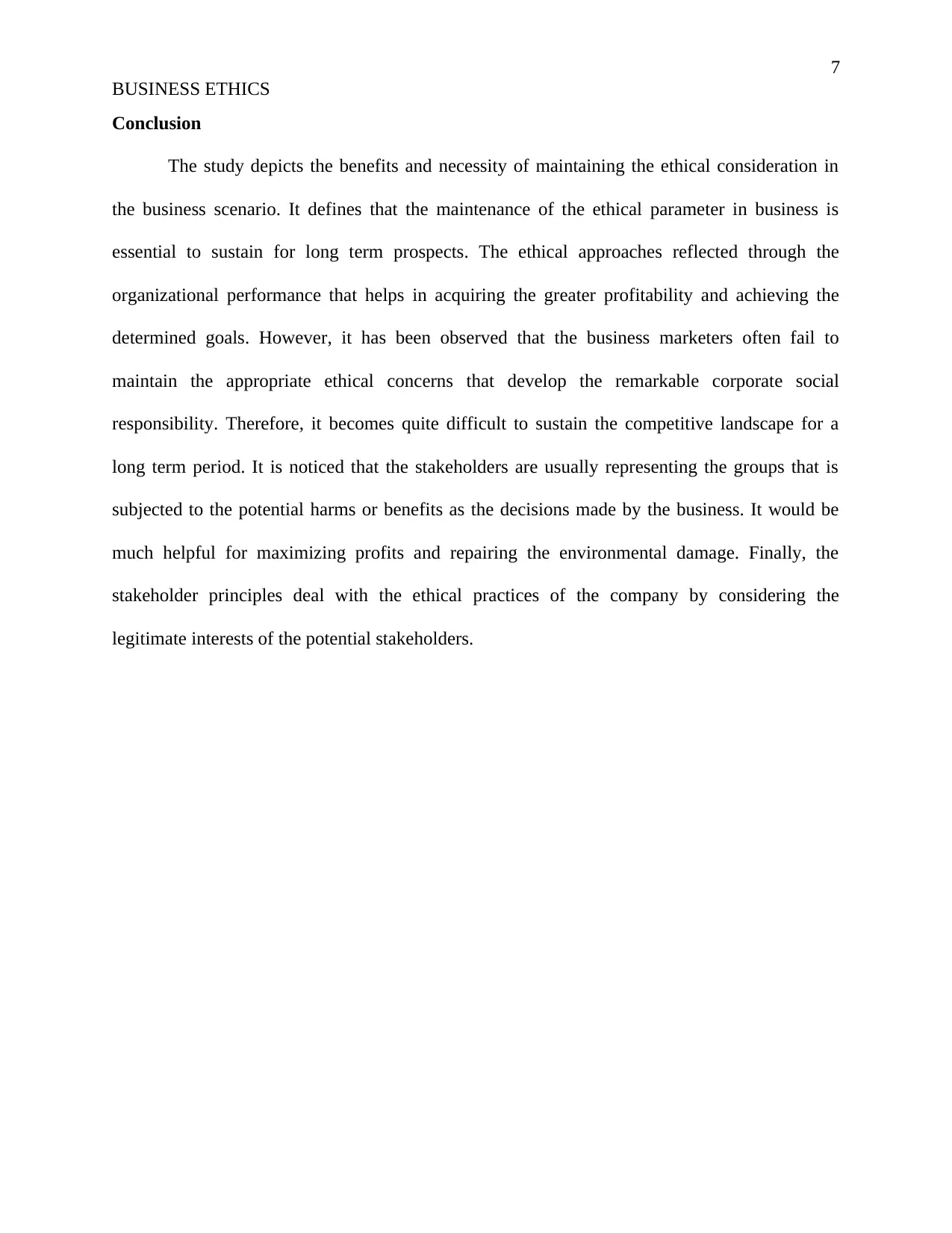
7
BUSINESS ETHICS
Conclusion
The study depicts the benefits and necessity of maintaining the ethical consideration in
the business scenario. It defines that the maintenance of the ethical parameter in business is
essential to sustain for long term prospects. The ethical approaches reflected through the
organizational performance that helps in acquiring the greater profitability and achieving the
determined goals. However, it has been observed that the business marketers often fail to
maintain the appropriate ethical concerns that develop the remarkable corporate social
responsibility. Therefore, it becomes quite difficult to sustain the competitive landscape for a
long term period. It is noticed that the stakeholders are usually representing the groups that is
subjected to the potential harms or benefits as the decisions made by the business. It would be
much helpful for maximizing profits and repairing the environmental damage. Finally, the
stakeholder principles deal with the ethical practices of the company by considering the
legitimate interests of the potential stakeholders.
BUSINESS ETHICS
Conclusion
The study depicts the benefits and necessity of maintaining the ethical consideration in
the business scenario. It defines that the maintenance of the ethical parameter in business is
essential to sustain for long term prospects. The ethical approaches reflected through the
organizational performance that helps in acquiring the greater profitability and achieving the
determined goals. However, it has been observed that the business marketers often fail to
maintain the appropriate ethical concerns that develop the remarkable corporate social
responsibility. Therefore, it becomes quite difficult to sustain the competitive landscape for a
long term period. It is noticed that the stakeholders are usually representing the groups that is
subjected to the potential harms or benefits as the decisions made by the business. It would be
much helpful for maximizing profits and repairing the environmental damage. Finally, the
stakeholder principles deal with the ethical practices of the company by considering the
legitimate interests of the potential stakeholders.
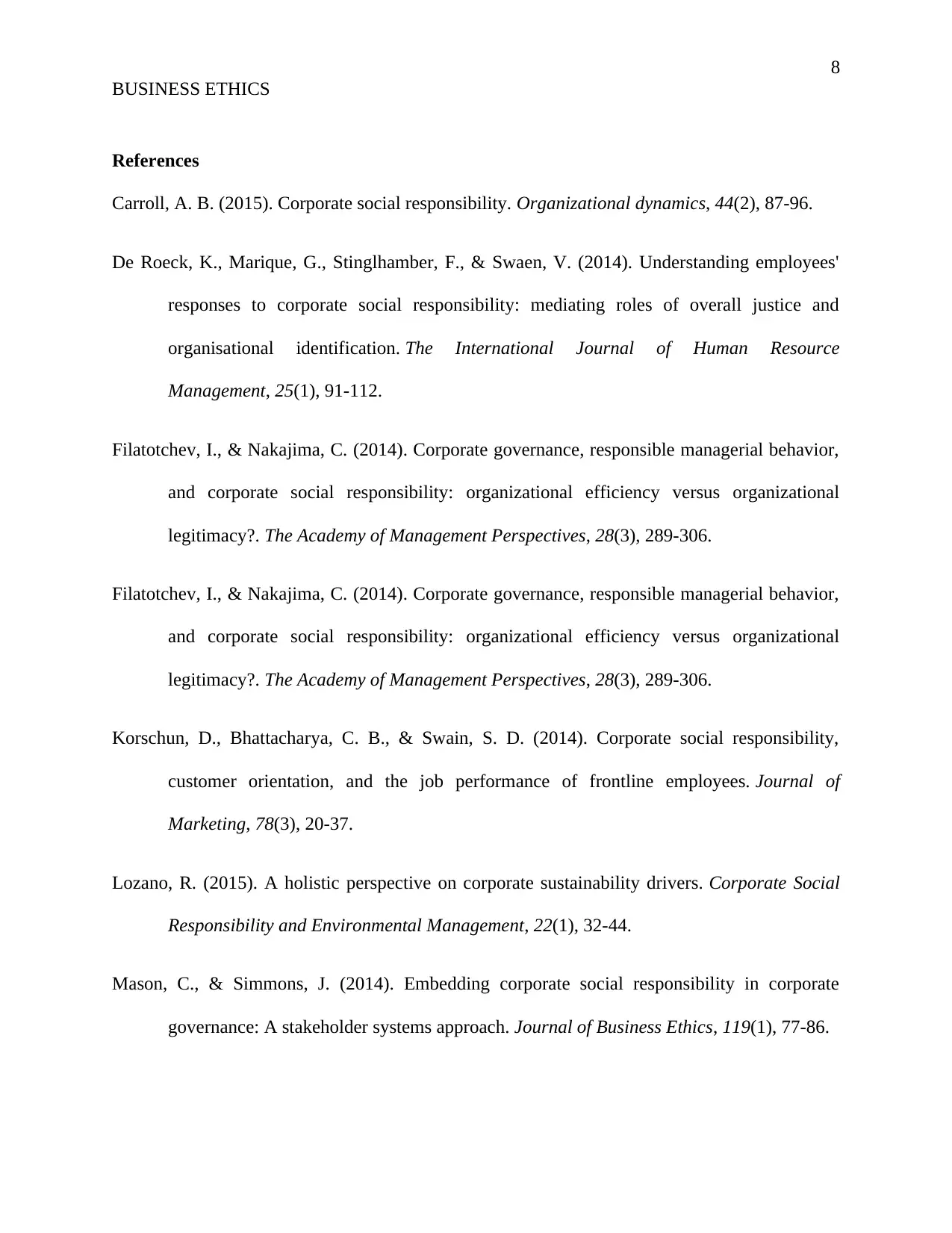
8
BUSINESS ETHICS
References
Carroll, A. B. (2015). Corporate social responsibility. Organizational dynamics, 44(2), 87-96.
De Roeck, K., Marique, G., Stinglhamber, F., & Swaen, V. (2014). Understanding employees'
responses to corporate social responsibility: mediating roles of overall justice and
organisational identification. The International Journal of Human Resource
Management, 25(1), 91-112.
Filatotchev, I., & Nakajima, C. (2014). Corporate governance, responsible managerial behavior,
and corporate social responsibility: organizational efficiency versus organizational
legitimacy?. The Academy of Management Perspectives, 28(3), 289-306.
Filatotchev, I., & Nakajima, C. (2014). Corporate governance, responsible managerial behavior,
and corporate social responsibility: organizational efficiency versus organizational
legitimacy?. The Academy of Management Perspectives, 28(3), 289-306.
Korschun, D., Bhattacharya, C. B., & Swain, S. D. (2014). Corporate social responsibility,
customer orientation, and the job performance of frontline employees. Journal of
Marketing, 78(3), 20-37.
Lozano, R. (2015). A holistic perspective on corporate sustainability drivers. Corporate Social
Responsibility and Environmental Management, 22(1), 32-44.
Mason, C., & Simmons, J. (2014). Embedding corporate social responsibility in corporate
governance: A stakeholder systems approach. Journal of Business Ethics, 119(1), 77-86.
BUSINESS ETHICS
References
Carroll, A. B. (2015). Corporate social responsibility. Organizational dynamics, 44(2), 87-96.
De Roeck, K., Marique, G., Stinglhamber, F., & Swaen, V. (2014). Understanding employees'
responses to corporate social responsibility: mediating roles of overall justice and
organisational identification. The International Journal of Human Resource
Management, 25(1), 91-112.
Filatotchev, I., & Nakajima, C. (2014). Corporate governance, responsible managerial behavior,
and corporate social responsibility: organizational efficiency versus organizational
legitimacy?. The Academy of Management Perspectives, 28(3), 289-306.
Filatotchev, I., & Nakajima, C. (2014). Corporate governance, responsible managerial behavior,
and corporate social responsibility: organizational efficiency versus organizational
legitimacy?. The Academy of Management Perspectives, 28(3), 289-306.
Korschun, D., Bhattacharya, C. B., & Swain, S. D. (2014). Corporate social responsibility,
customer orientation, and the job performance of frontline employees. Journal of
Marketing, 78(3), 20-37.
Lozano, R. (2015). A holistic perspective on corporate sustainability drivers. Corporate Social
Responsibility and Environmental Management, 22(1), 32-44.
Mason, C., & Simmons, J. (2014). Embedding corporate social responsibility in corporate
governance: A stakeholder systems approach. Journal of Business Ethics, 119(1), 77-86.
⊘ This is a preview!⊘
Do you want full access?
Subscribe today to unlock all pages.

Trusted by 1+ million students worldwide
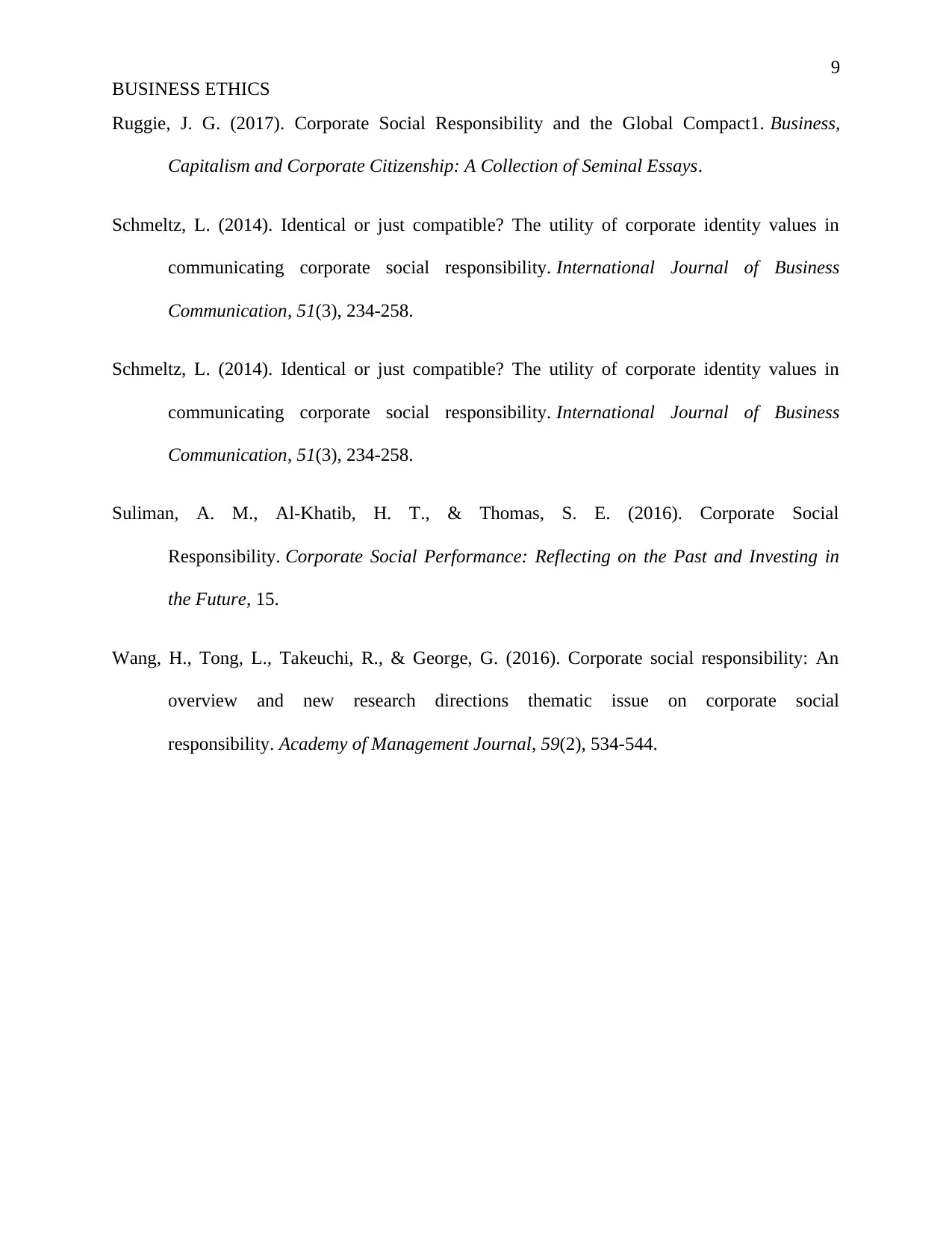
9
BUSINESS ETHICS
Ruggie, J. G. (2017). Corporate Social Responsibility and the Global Compact1. Business,
Capitalism and Corporate Citizenship: A Collection of Seminal Essays.
Schmeltz, L. (2014). Identical or just compatible? The utility of corporate identity values in
communicating corporate social responsibility. International Journal of Business
Communication, 51(3), 234-258.
Schmeltz, L. (2014). Identical or just compatible? The utility of corporate identity values in
communicating corporate social responsibility. International Journal of Business
Communication, 51(3), 234-258.
Suliman, A. M., Al-Khatib, H. T., & Thomas, S. E. (2016). Corporate Social
Responsibility. Corporate Social Performance: Reflecting on the Past and Investing in
the Future, 15.
Wang, H., Tong, L., Takeuchi, R., & George, G. (2016). Corporate social responsibility: An
overview and new research directions thematic issue on corporate social
responsibility. Academy of Management Journal, 59(2), 534-544.
BUSINESS ETHICS
Ruggie, J. G. (2017). Corporate Social Responsibility and the Global Compact1. Business,
Capitalism and Corporate Citizenship: A Collection of Seminal Essays.
Schmeltz, L. (2014). Identical or just compatible? The utility of corporate identity values in
communicating corporate social responsibility. International Journal of Business
Communication, 51(3), 234-258.
Schmeltz, L. (2014). Identical or just compatible? The utility of corporate identity values in
communicating corporate social responsibility. International Journal of Business
Communication, 51(3), 234-258.
Suliman, A. M., Al-Khatib, H. T., & Thomas, S. E. (2016). Corporate Social
Responsibility. Corporate Social Performance: Reflecting on the Past and Investing in
the Future, 15.
Wang, H., Tong, L., Takeuchi, R., & George, G. (2016). Corporate social responsibility: An
overview and new research directions thematic issue on corporate social
responsibility. Academy of Management Journal, 59(2), 534-544.
1 out of 10
Related Documents
Your All-in-One AI-Powered Toolkit for Academic Success.
+13062052269
info@desklib.com
Available 24*7 on WhatsApp / Email
![[object Object]](/_next/static/media/star-bottom.7253800d.svg)
Unlock your academic potential
Copyright © 2020–2025 A2Z Services. All Rights Reserved. Developed and managed by ZUCOL.




